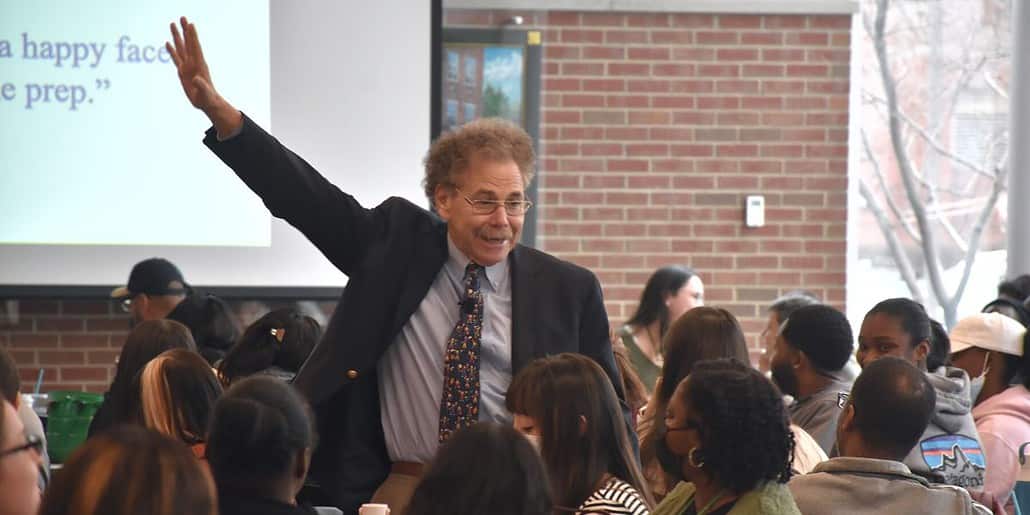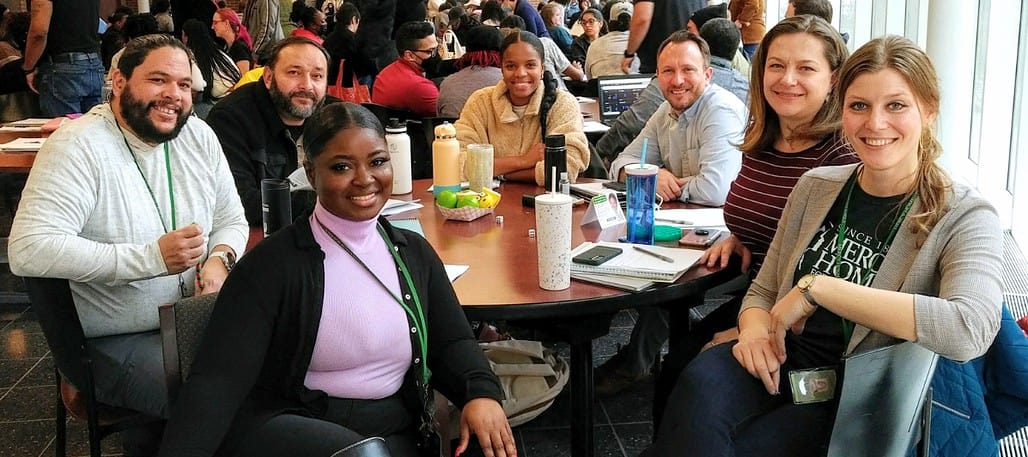All Roads Lead to Home
Some people chart a clear course in life early on, while others wander until they find their way. But some,...
May 1, 2024
At Mercy Home, prioritizing professional development and training to support the work our coworkers do is key. With an emphasis on trauma-informed care, the young people we serve are given the resources they need to heal from the trauma of abuse, neglect, housing instability, poverty, and neighborhood violence.
With each child arriving at our Home having their own unique needs, along with the constantly evolving nature of trauma-informed care, Mercy Home provides our coworkers with the training they need to implement the best practices in the care of our children.

We are fortunate to have a dedicated Learning and Development team who focus specifically on the professional development of our coworkers. Among the important topics our coworkers learn about while at Mercy Home is the Mercy Model, which was adapted from three key frameworks, including the Attachment, Regulation, and Competency Framework (ARC), The Transition to Independence Process (TIP), and The Neurosequential Model of Therapeutics (NMT).
The Mercy Model helps our coworkers understand how trauma and adversity impact youth development, as well as informs the skills used by our coworkers and those taught to their caregivers. It also serves as a guideline to help our kids build the necessary skills to feel safe, healthy, relationally connected, and effective as they transition to life outside of Mercy Home.
During the COVID-19 pandemic, many of the measures taken to ensure the safety of our young people and coworkers also meant that much of the culture in our residential care was changed. In order to re-train and re-energize our coworkers as we move forward, Mercy Home recently held a special training about how we can better implement Mercy Model of Care concepts.
We were thrilled to welcome Charlie Appelstein, a leading youth care specialist, for a recent all-coworker training. This training, “Understand and Responding to Youth with Emotional and Behavioral Challenges Using a Positive, Trauma-Informed, Strength-Based Approach,” was given to all of our coworkers who work directly with our young people.

Emily Neal, the Vice President of Organizational Development at Mercy Home, said that this training, which was the first of its kind since the beginning of the pandemic, was the perfect opportunity to kick Mercy Home’s training program back in high gear.
“We were looking for more opportunities to inspire staff and help them get reconnected to why we do what we do,” she said. “Charlie is exceptional at helping people get back in touch with that and focus on our strengths and the strengths of the youth, [as well as] the privilege we have to be part of their lives.”
Neal explained that uplifting trainings like this one are necessary to get our coworkers excited about the opportunity they have to make a positive impact on our young people and their families.
“[We wanted] to get people excited again and get their creativity flowing,” Neal said. “I think it really did that, because I’ve heard from a lot of people about how they’ve used some of what they learned in the training or how it got them fired up to get back in the milieu.”
A key part of the training that Appelstein provided highlighted the fact that the job of residential treatment facilities like Mercy Home is to set the record straight that there is no such thing as a bad kid. Our coworkers can help our kids by not reinforcing negative beliefs they may have about themselves. Appelstein discussed the epidemic of friendless kids, something that our coworkers have seen with the children at Mercy Home. Many of our boys and girls come to our Home without meaningful social connections due to the difficult circumstances of their home lives. This can lead to them feeling unworthy of positive connections with others, which can in turn lead to behavior that impedes their ability to befriend others.
“Our job is to draw out their strengths and their gifts and surround them with this unconditional love,” Neal said. “[We are] there to help shift their concept of who they are and what they’re capable of. That was an overarching theme [of the training].”
Appelstein also discussed ways that coworkers can support one another, whether it’s peer-to-peer support or support from a supervisor. He discussed ways for our coworkers to not take things personally and self-management strategies that allow our coworkers to always show up at 100 percent for our kids, even when it’s difficult.
Meg Prahin, the Director of Learning and Development, said that she has received positive feedback from the coworkers who attended the training.
Our job is to draw out their strengths and their gifts and surround them with this unconditional love,
– Emily Neal, Vice President of Organizational Development at Mercy Home
“[I’ve heard] that people appreciated his energy [and] some of the creative in-the-moment strategies he shared,” she said.
Prahin added that often people leave trainings unsure about how to implement the information they heard, but that wasn’t the case with this particular training. Appelstein suggested fun and creative ways that our coworkers can use to engage with our kids when problems arise.
This incredible training was possible thanks to the support of our generous friends at the Tracy Family Foundation, who provided a grant to make the day possible.
The Tracy Family Foundation seeks to make the world a better place through engaged, thoughtful, and strategic philanthropy. They are committed to capacity building, which is what is needed to bring a nonprofit to the next level of success and help that organization more effectively advance its mission.
Through its Capacity Building Grant Program, the Tracy Family Foundation helps organizations to gain the knowledge, tools, and resources to make improvements in their work. Because of their contribution to this training session, they have helped make our coworkers more prepared and confident to work with our young people. The foundation has also supported our kids’ wellness through donations toward their medical, dental, and psychiatric care in the past. We are grateful for their friendship that makes so many great things possible at Mercy Home.
“The Tracy Family Foundation is committed to helping organizations thrive,” Dan Teefey, the Executive Director of the Tracy Family Foundation, said. “We love when organizations like Mercy Home proactively invest in their staff and encourage them to develop the skills they need to make the greatest impact.”
Trainings like this one are key to attracting, training, and retaining coworkers at Mercy Home. That is why, with the help of our friends at the Tracy Family Foundation and the Robert R. McCormick Foundation – a long-time supporter of our Learning and Development program – we are dedicated to making sure our coworkers have access to professional development opportunities.
“The work that we do is challenging and there’s not always time for staff to step back and reframe and reflect on the work,” Prahin said. “I think it’s our responsibility to ensure that [coworkers] have these opportunities. If you’re not able to get reconnected to your why, it’s going to be really difficult to sustain the work. So we take that responsibility seriously to make sure we’re carving out spaces for coworkers to do that.”
Some people chart a clear course in life early on, while others wander until they find their way. But some,...
May 1, 2024
A safe and stable home is crucial for a child to succeed. But without it, things can quickly fall apart....
April 30, 2024
Our hearts don’t always feel what our minds know. Blessed Pope John XXIII said, “The heart follows the mind almost...
April 30, 2024
Comments